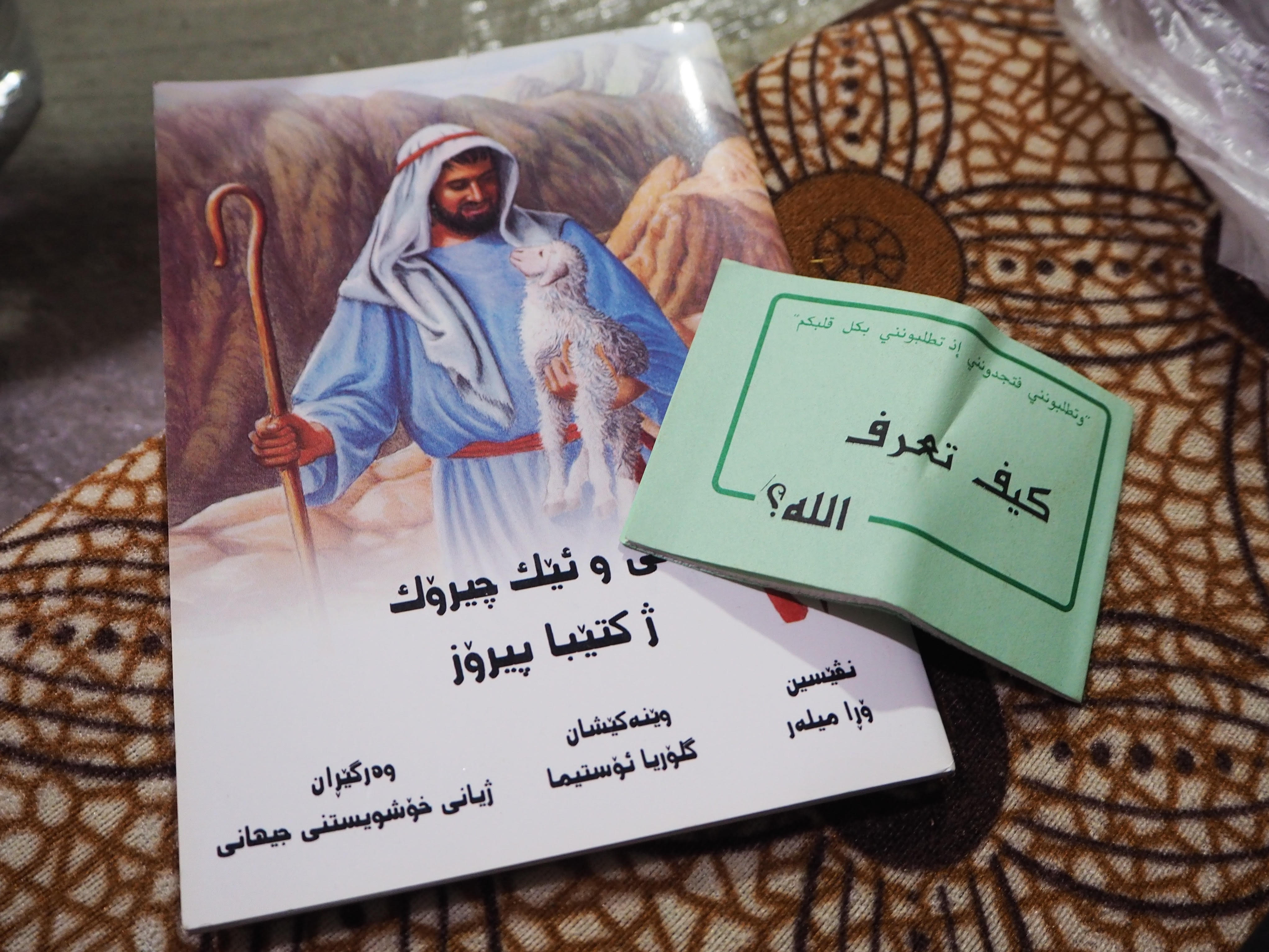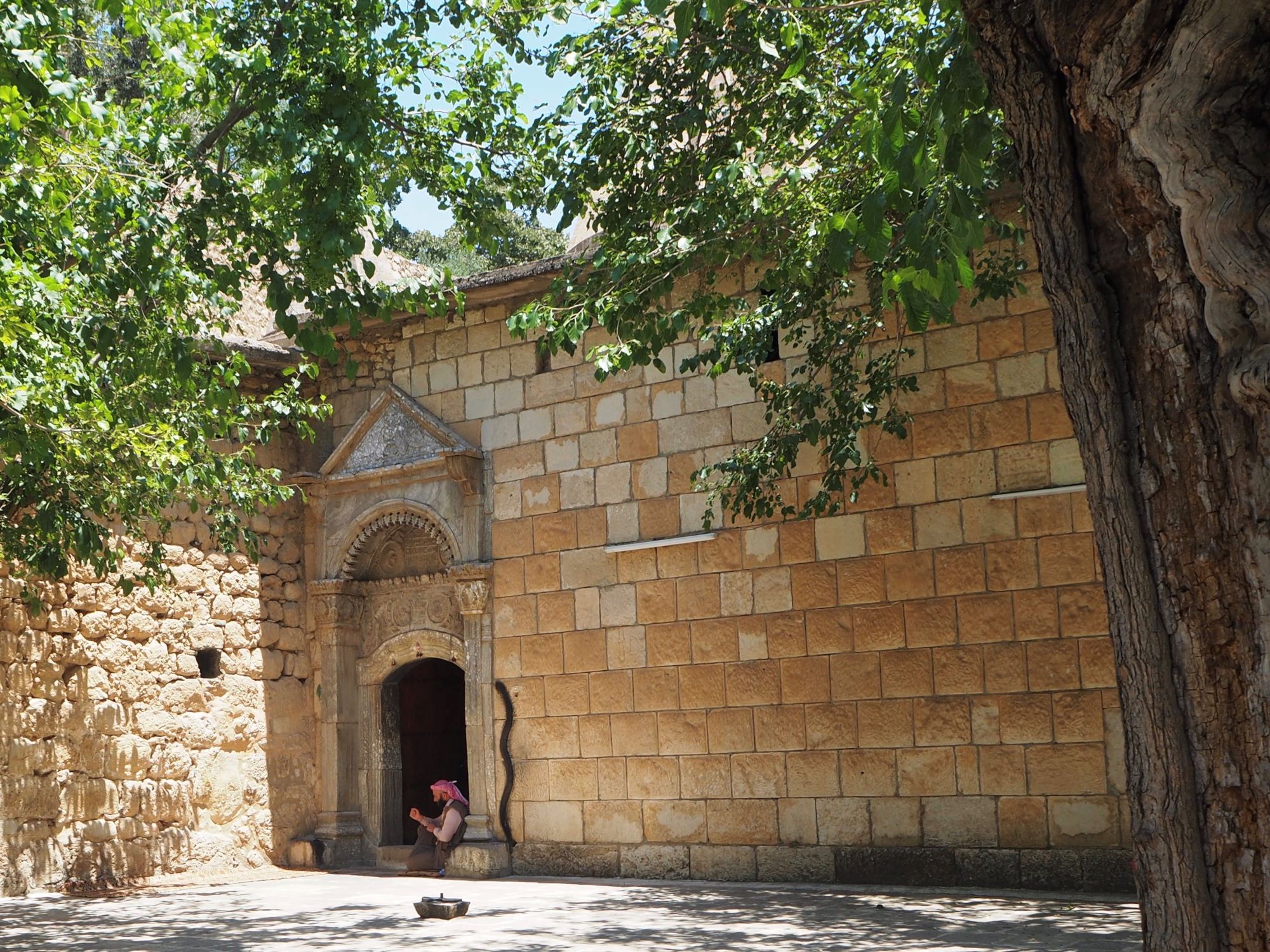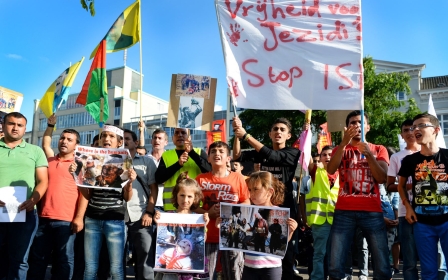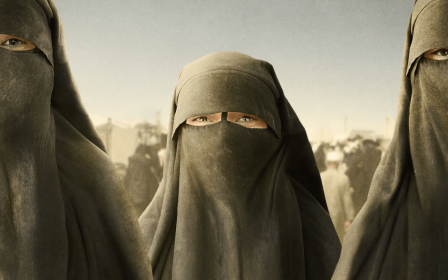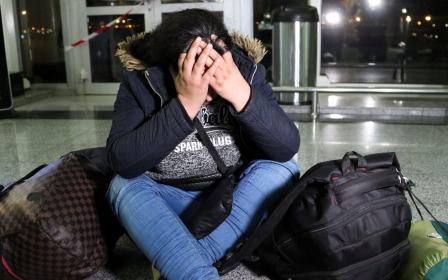Iraq: Christian NGOs accused of trying to convert Yazidis
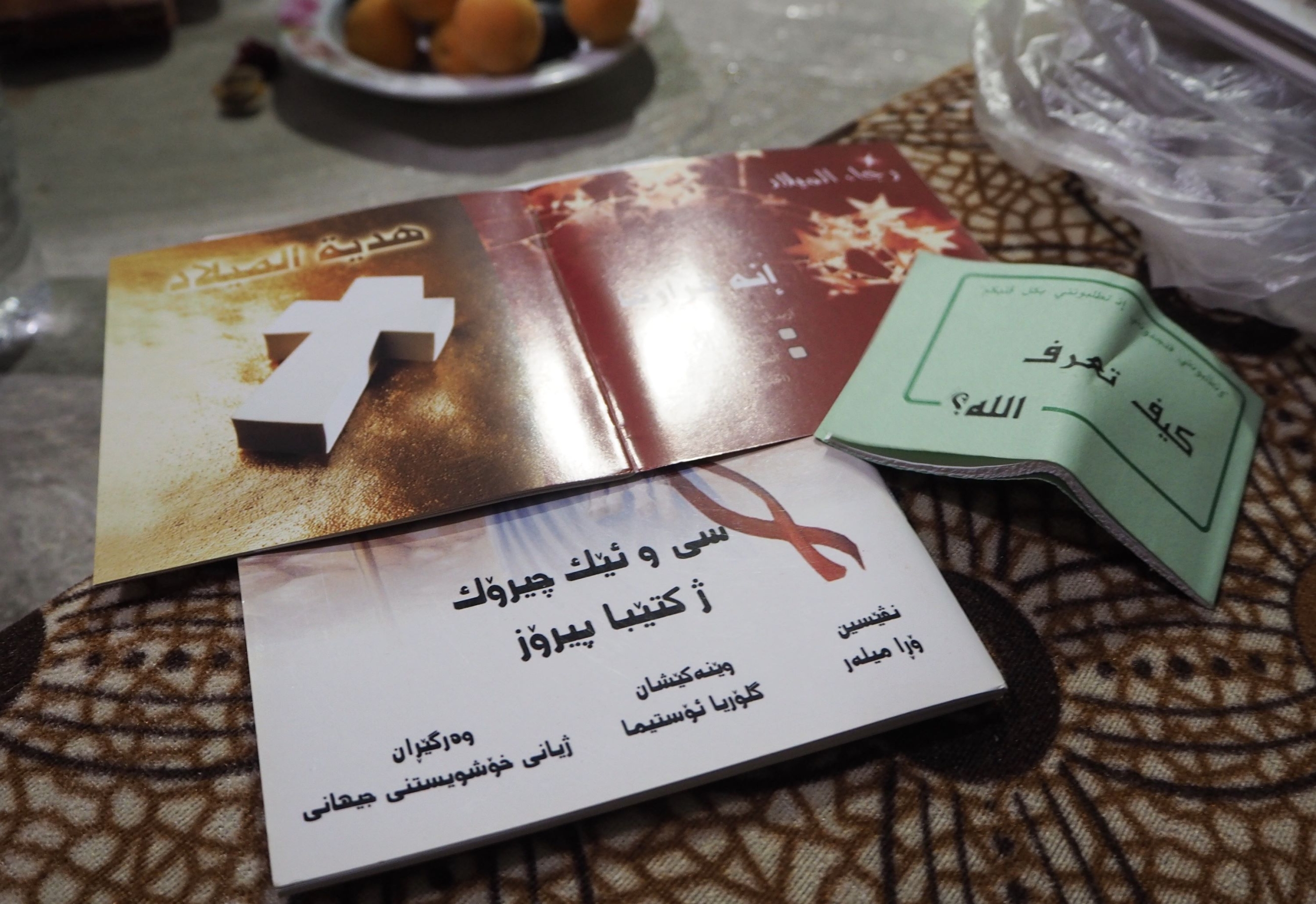
Sara* is one of the many survivors of the Islamic State's mass enslavement of Yazidis in northern Iraq and, since being rescued in 2017, still lives in a roadside tent as part of an informal IDP camp.
With limited support from the authorities, Western NGOs have become a lifeline for Sara and other displaced people.
However, there are now increasing concerns that a number of these NGOs have another purpose beyond merely providing aid - proselytising the Christian faith.
“The Christians teach us English in the camp and take us to a Duhok church for two hours between classes,” said Sara.
“We usually go in groups of between eight and 12. There’s no obligation to go to church but I go because I want to learn English and move abroad, and they are very good to us. They give us food and money.”
New MEE newsletter: Jerusalem Dispatch
Sign up to get the latest insights and analysis on Israel-Palestine, alongside Turkey Unpacked and other MEE newsletters
A video released on social media last month showing western Christians praying against what they described as a “satanic curse” outside a Yazidi temple in northern Iraq - which sparked outrage - was just the latest manifestation of years of surreptitious evangelical efforts targeting Iraq’s most beleaguered minority.
Sara said during church services, which she attends several times a week, the mostly American Christians spoke in English, with Kurdish translation.
“They talk about God, peace, and humanity. They ask us what we want - I say I want to learn English and go abroad, but everyone says something different and they say things and make us repeat them,” she said.
“Some of my friends wear crosses in church but I don’t. Some wear the crosses all the time, but they haven’t converted.”
The pressure being applied on IDPs by foreign missionaries has outraged many Yazidis, particularly in the wake of the mass forced conversions imposed on them by IS.
Haider Sheshu, commander of the Ezidkhan Protection Forces - a Yazidi branch of the Kurdish Peshmerga - said the Christian missionaries were exploiting the vulnerability of those in the camps.
"These missionaries take advantage of people’s poverty... it’s shameful because to change your religion is not an easy thing, and it is unacceptable to use aid as a way to pressurise people to convert,” he said.
“These NGO missionaries are basically the same as IS - and of course we will fight them, as we fought IS.”
'Reprehensible'
Yazidis have long faced persecution from other religious groups, including both Christians and Muslims.
Primarily, this stems from the belief that one of the central figures in the Yazidi religion, Melek Taus, is analogous to Satan in the other Abrahamic faiths, leading to accusations of Satanism.
This animosity to the faith, combined with the precarity that many displaced Yazidis live with, has made them a target for religious proselytisers.
Shariya camp, near Duhok, is currently the IDP camp most heavily targeted by Christian missionary organisations, which focus on teaching children aged 4-17 about Christianity through music and art, including during full-time summer school programmes.
“I saw many children, in school and in the street, singing Christian songs, telling each other things like ‘Jesus will save you’, ‘Jesus is God’ and even drawing pictures of Biblical scenes,” said one Yazidi teacher, speaking on condition of anonymity.
“They pay special attention to orphans and the handicapped but they target all the camp’s youth because children are so impressionable.”
A number of groups, primarily American Protestant organisations, have been at the forefront of the missionary work.
The incident at the Yazidi temple was organised by Light A Candle, an American group founded by Sean Feucht, a singer-songwriter and activist who claims to have had four number-one albums in the Christian worship section of iTunes and was described by Rolling Stone magazine as having a "far-right Christian nationalist agenda" and being a staunch supporter of former President Donald Trump.
MEE also saw among Sara’s English language books a plastic bag containing multiple copies of pamphlets given to her by a Christian NGO, which she declined to name, for distribution.
Written in Kurdish or Arabic, these were illustrated with diagrams depicting ways to reach God or cheery biblical scenes. One, published by Christian Aid Ministries, featured two Iraqi phone numbers, both of which went unanswered.
“It is aggressive Protestant proselytising among Yazidis and even among Iraq’s apostolic Catholic Christian communities,” a Westerner working with Iraq’s indigenous Christians told MEE, speaking on condition of anonymity.
He claimed some evangelical organisations had close ties to the US government and access to vast funds, which had helped them forge good relationships with the autonomous Kurdistan Regional Government, which oversees most Yazidi IDP camps.
“They say they’re coming to help poor Iraqi Christians but, in reality, it’s clear their long-term plan is to convert, even among native Christian populations. It is reprehensible to take advantage of a wounded people.”
'Poverty and desperation'
Although most conversion efforts focus on IDP camps, proselytising NGOs have also reached the Sinjar area - which falls under the control of the central Baghdad government - with reported conversions in small obscure outlying villages showing the extent of their reach.
“Conversions are not about religion, but because of poverty and desperation,” said Khal Ali, Commander of Sinjar’s Lalish Battalion (part of Iraq’s irregular Hashd al-Shaabi forces), who confirmed that a number of NGOs in Sinjar had been identified as missionaries.
“People are desperate so, if they are offered $1,000, they will accept being called Christian.”
Because bureaucratic procedures make it more complex for NGOs to work under the Baghdad government, some missionary NGOs circumvent this by basing themselves in Iraqi Kurdistan and partnering with local NGOs to reach Sinjar.
American NGO The Restoration Act, which recently signed an agreement with a local NGO to develop a year-long education project in Sinjar, was cited by several Yazidis as actively promoting the Christian faith, both in Sinjar and in camps.
“They work in a very smart way, teaching English, nursing, midwifery, and sewing,” explained one local activist. “They also hand out grants of between $800 and $2,000 to individuals and, during such activities, they talk about God and lead people towards a path of conversion.”
'They also hand out grants of between $800 and $2,000 to individuals and, during such activities, they talk about God and lead people towards a path of conversion'
- Local activist
The Restoration Act’s president and founder Becky Thompson denied that members of the organisation promoted Christianity or sought to convert Yazidis.
One secular NGO working in Sinjar told MEE that, several years ago, another organisation threatened to compromise their work by sending them boxes of toys, asking for these to be given to needy local children. But then, Bibles were found hidden underneath the toys and distribution stopped.
In the Yazidi town of Sinouni, a local told MEE a close friend quit her lucrative NGO job after witnessing volunteers reading the Bible to young children. In a telephone call, she declined to speak to the press, name the organisation, or share photos she had taken of the Bible classes, saying she was planning to publicise these independently.
While at least one missionary NGO was reportedly prevented from working in Sinjar by Baghdad, with indigenous Christians widespread across Iraq - and Sinjar lying in a remote, rural region near the Syrian border - comprehensively policing the work of all NGOs is challenging, especially where conversion drives are carried out secretly.
US NGO Samaritan’s Purse is one of the largest faith-based organisations working in Sinjar and, in a 2019 interview, when asked if Yazidi employees were encouraged to convert, country director Matthew Nowery replied: “Absolutely not.”
A former Samaritan’s Purse employee told MEE there was greater pressure to attend devotions than convert, but said most employees attended devotions, or even converted for the show, fearing otherwise they might lose their jobs.
"I don’t think it’s right. They came here when they knew the Yazidis were vulnerable and offered help. What should people do? They needed help and money, so, of course they agreed to say they were Christian," he said.
Another former staff member told MEE that some aid recipients, as well as employees, had converted, but added that Samaritan’s Purse had poured millions of dollars into Sinjar projects.
“When aid is delivered, prayers are said and beneficiaries are told this help is given in the name of Jesus, but I did not see any pressure put on beneficiaries to convert,” he said.
'Another genocide'
Yazidi religious leaders see the conversion attempts in near-apocalyptic terms, stoking further fears about the long-term future of their faith.
Harman Mirza Bak, a senior figure in the Yazidi ‘royal’ class, said the conversions were “like another genocide”.
“It’s like IS but actually it’s worse than IS. There’s no difference between someone who forces you to convert at gunpoint like IS and someone who uses your bad circumstances to pressurise you into converting,” he said.
“We have our habits and traditions, and we’ve been fighting for these for thousands of years.”
Bak, who has been researching conversions and meeting with community elders to alert them to the dangers, insisted these were rarely genuine. A handful of converts have even reportedly become disenchanted with Christianity and, after unsuccessful asylum applications have reverted to their original faith.
“Even when people do convert, they say they are still Yazidi believers in their minds,” he said. “Yazidis don’t have a book for their religion. It’s all in the mind. Although they’re trying very hard, the missionaries are not getting big results.”
But other Yazidis told MEE few would admit to having converted, fearing being ostracised by the community. Even those now living abroad as Christians do not publicise their faith, which could bring shame upon family members still in Iraq.
Sara initially told MEE she had not converted either - but later admitted she had to MEE’s translator.
“If you are intelligent, you know what they want, which is for you to convert," she said.
Although NGOs remain primary employers and aid providers in Sinjar, Bak was adamant the Yazidi community did not want aid from Christian organisations if they continued to push a religious agenda.
“If this continues, one day there will be no Yazidis left at all," he said.
But, for those now in their ninth year of living in camps or in poverty in Sinjar, missionary NGOs still offer vital support they have not found from Iraq’s respective governments in Baghdad and Erbil.
For Sara, her conversion and association with the unnamed missionary NGO working in Shariya Camp led to her successfully entering a refugee programme.
A few months after speaking to MEE, she left her roadside tent and was taken to Europe to start a new life.
*Some names have been changed.
Editor's note: An earlier version of this story included an image of a church in Dohuk where Yazidis were purpotedly taken for services. The church asked MEE to withdraw the image as it denied activities reported here took place there and said it has no links to the NGOs mentioned in this article.
This article is available in French on Middle East Eye French edition.
Middle East Eye delivers independent and unrivalled coverage and analysis of the Middle East, North Africa and beyond. To learn more about republishing this content and the associated fees, please fill out this form. More about MEE can be found here.


